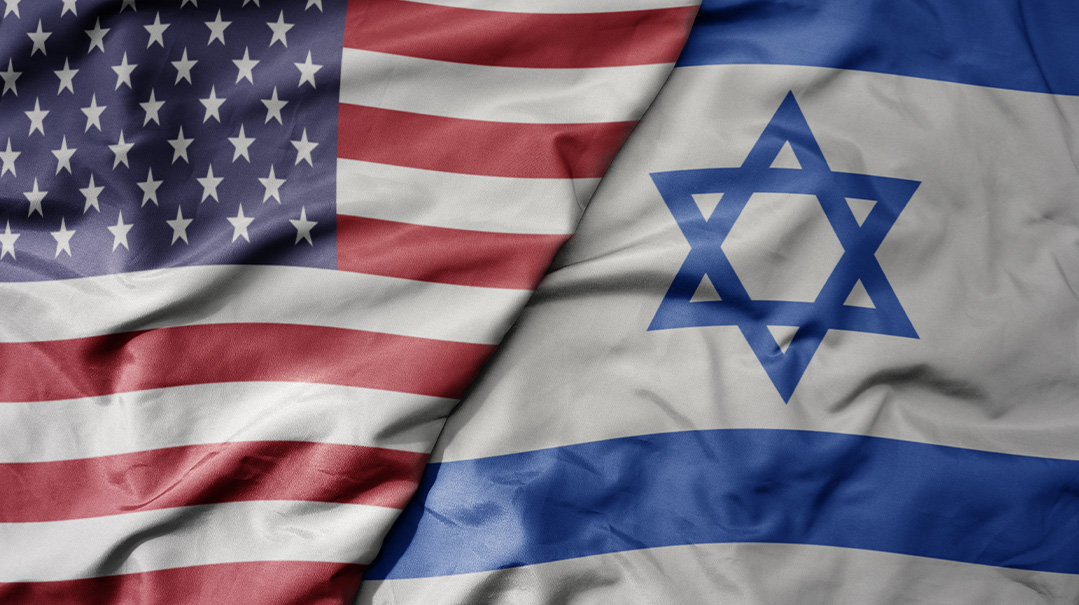The Latest American Betrayal

The “Ramadan” cease-fire is but one example of the dangers that lurk in too great, and misplaced, sensitivity

AS American betrayals of Israel go, the Biden administration’s failure to veto UN Security Council Resolution 2728 calling for a Gaza cease-fire during Ramadan leading to a “lasting” cease-fire does not begin to compare to the Obama administration’s failure to veto UNSC Resolution 2334. The latter declared all land held by Israel beyond the 1949 armistice lines to be occupied territory. Passed in the waning days of the Obama presidency, just two weeks prior to Donald Trump’s entry into office, it was designed to hamstring the incoming administration.
As the late Yale professor and former State Department chief of staff Charles Hill wrote at the time: “The first thing Obama did when entering office was to derail all hopes for an Israeli-Palestinian agreement by declaring all settlements to be illegal. Now, the last thing he’s done is to enshrine that anti-Israel position into international law in language that can be followed up with sanctions to delegitimize Israel’s existence itself.”
That resolution made it impossible for any Palestinian leader ever to make concessions to Israel regarding Jerusalem or on so-called “settlement blocs,” for to do so would be ceding “stolen Palestinian lands.” And Obama knew full well that Israel would never agree to return the Kosel or transfer over 750,000 citizens, including 300,000 in new neighborhoods of Jerusalem, or to return to the pre-1967 “Auschwitz borders.” (Then–vice president Joe Biden personally lobbied Ukrainian president Petro Proroshenko not to withdraw Ukrainian sponsorship of the resolution, after Egypt did so at Trump’s request.)
I predicted at the time that UNSC Resolution 2334 would legitimize the BDS movement and its repercussions would be felt on every college campus. How true that has proven. In addition, it vindicated the strategy outlined by Palestinian Authority chairman Mahmoud Abbas, as outlined in a 2009 meeting with the Washington Post editorial board: Eschew direct negotiations with Israel and rely exclusively on American pressure on Israel.
The March 25 “Ramadan cease-fire” resolution, and the American failure to veto it, was not as malevolent. But it was plenty bad enough, and similarly vindicated Hamas’s longtime strategy. David Brooks, in a lengthy essay in the New York Times, quotes MIT professor Barry Posen, who describes Hamas’s strategy as “human ammunition.” In other words, “maximize the number of Palestinians who die, and in that way build international pressure until Israel is forced to end the war before Hamas is wiped out.” In short, Hamas’s survival depends on “making this war as bloody as possible for civilians.”
And UNSC Resolution 2728 shows that strategy is working. Hamas, naturally, “welcomed” the resolution, though it immediately rejected the resolution’s demand for “the immediate and unconditional release of all hostages.” It was free to have its cake and eat it too, because unlike previous cease-fire resolutions drafted by the United States, and vetoed by Russia and China, this one did not make the cease-fire contingent on the release of hostages. It also did not condemn Hamas’s October 7 invasion and massacre of Israeli civilians, as had the US-drafted resolutions.
Russia and China got their way, and pressure on Hamas to release the hostages was reduced in two ways: First, by giving Israel pause before launching a major operation in Rafah, where the remaining Hamas battalions are hunkered down; second, by delinking the hostage release from the cease-fire.
Typical of American foreign policy over the past three and a half years — e.g., the hasty and ill-planned withdrawal from Afghanistan, and the continued transfer of tens of billions of dollars to Iran, even as that regime masterminds attacks on America and American allies — the message of the US abstention was one of confusion and weakness. Spokesman John Kirby insisted that the abstention on the resolution did not represent a shift in the American position. But if that was the case, it is only because, as Matthew Continetti wrote, “to change a policy, you must first have a policy. And it is increasingly clear that the Biden administration has no coherent Israel policy, nor a coherent policy for the Greater Middle East.” Rather it is buffeted between its recognition that no peace can be had as long as Hamas remains in power and its desire not to lose Palestinian voters in Dearborn, Michigan.
After surveying all possible alternatives to a large-scale Israeli action in Rafah, the Times’ Brooks concludes, “I’m left with the tragic conclusion that there is no magical alternative military strategy.” He quotes Raphael S. Cohen of the Rand Corporation, writing in Foreign Policy, “If the international community wants Israel to change strategies in Gaza, then it should offer a viable alternative strategy to Israel’s announced goal of destroying Hamas in the Strip. And right now, that alternative strategy simply does not exist.”
Moreover, there can be no serious discussion of any postwar political solutions for Gaza or the larger Palestinian-Israel conflict, “as long as Hamas is still governing Gaza or commanding a coherent military force,” argue Robert Satloff and Dennis Ross in American Purpose. If Hamas survives the war intact, the global community will have little incentive to invest in rebuilding Gaza, as “Hamas would rebuild its military to continues its efforts to exterminate the Jewish state,” says Brooks.
It is hard to gainsay Seth Mandel’s conclusion in Commentary that the biggest loser of the US abstention was President Biden himself. That abstention confirms his image as “doormat not a doorstop,” and that he can simply be waited out, as Russia and China did at the UN, in their insistence that a cease-fire not be conditional on the release of hostages or the condemnation of Hamas.
Once again, the president has shown himself no match for the Iranians, who have consistently and shrewdly opened up a seven-front war on Israel. They have a clear goal — the elimination of the “Little Satan,” Israel, before moving on to the “Big Satan,” the United States — and a clear step-by-step plan for achieving it. Were Israel not to eliminate Hamas now, its deterrent power against the many enemies on its borders would be shattered.
The consequences of such a failure would be felt first and foremost by Israel, just as Czechoslovakia first felt the Nazi boot, but they would reverberate across the world. As Danielle Pletka of the American Enterprise Institute writes, “The White House and its allies in Europe... face two options: engage in a region ever more dominated by Iran and its proxies, or cede Iranian dominance, replete with a lethal nuclear weapons program. The choice should be obvious.” Yet it appears once again that the US and its European allies on the UN Security Council have chosen wrongly.
I WANT TO FOCUS on one other aspect of the recent resolution because it points to a much larger problem in American foreign policy. The resolution explicitly calls for a cease-fire during Ramadan. As the US ambassador to the UN explained, “This should be a season of peace. This rightly acknowledges that during the month of Ramadan, we must recommit to peace.”
What beautiful solicitude to the sensitivities of Muslims, right? Well, not so fast. For one thing, the emphasis on Ramadan casts Israel as waging a religious war rather than one of straightforward self-defense. And Israel’s Muslim enemies have not exactly been solicitous of Jewish religious feelings — or rather, they have been acutely aware of Jewish holidays. Egypt and Syria chose Yom Kippur to launch surprise attacks on Israel in 1973, and fifty years later, almost to the day, Hamas attacked on Simchas Torah.
Nor is Ramadan exactly a month of peace for Muslims. It commemorates, inter alia, Muhammad’s defeat of Meccan tribes at the Battle of Badr; Saladin’s defeat of the Crusaders at the Battle of Hattin; the Muslim conquest of Andalusia, and the defeat of the Mongols by Mamluks in the Battle of Ain Jalut. In 1982, Iran launched human wave attacks against their fellow Muslims in Iraq in the Ramadan Offensive. And in 2006, Iraqi insurgents dramatically increased attacks on occupying American forces during Ramadan, including many suicide attacks. Many of the attackers believed that death in jihad, or holy war, during Ramadan would confer special merit upon them.
This extreme deference to Muslim religious sensitivities is directly proportional to the ignorance of Islam, for which the West has been paying a heavy price in recent years. President Obama’s misbegotten belief that deference to Iran would somehow turn Iran into a status quo power totally failed to take into account the Islamic Revolution’s designs on spreading the rule of Islam internationally. As the name “Islamic Revolution” implied and as Ayatollah Khomeini repeatedly stated, its sights were upon the entire world, the very opposite of a status quo power.
When German chancellor Angela Merkel opened the gates of Europe wide to Muslim refugees, it is doubtful that she had much awareness of the factors that might make their absorption into Europe a difficult project, if not impossible. For one thing, most of the refugees had spent their entire lives in majority Muslim lands and had no experience of living as a religious minority or of showing tolerance to those of other faiths, other than as submissive dhimmis. Moreover, Islam has nothing comparable to the Torah’s rule of dina d’malchusa dina, which allows Jews to function as loyal citizens of their host countries.
Just last week, the Office of the Director of National Intelligence (ODNI) instructed employees to avoid terms like “radical Islamists” or “jihadists,” as they are hurtful to Muslim-Americans. But banning words not to be mean does not make phenomena disappear. If radical Islam describes a certain congeries of belief, if Islamofascism is a phenomenon, then banning use of these terms only makes the phenomenon more dangerous. For that which we cannot discuss, we cannot take action against, either.
Martin Gilbert, the great biographer of Winston Churchill, wrote that Churchill felt his greatest failure was to alert his countrymen to the nature of Nazism in time, as that might have spurred them to action. And toward the end of his life, Gilbert saw the same thing repeating itself with respect to radical Islam. 9/11 was a brief wake-up call, but much of the West has returned to a peaceful somnolence, out of the most exquisite sensitivity. But it does so at its peril.
The “Ramadan” cease-fire is but one example of the dangers that lurk in too great, and misplaced, sensitivity.
(Originally featured in Mishpacha, Issue 1006. Yonoson Rosenblum may be contacted directly at rosenblum@mishpacha.com)
Oops! We could not locate your form.







